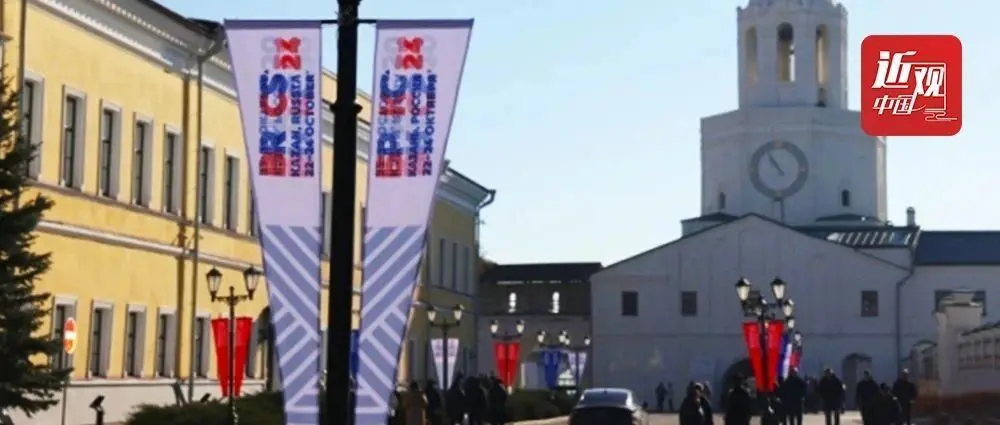Xi Jinping's Visit to Kazan Kicks Off, "Big BRICS" Continues to Write New Visions

On the morning of the 22nd, Chinese President Xi Jinping traveled by special plane to Kazan, where he attended the 16th Summit of BRICS Leaders at the invitation of Russian President Vladimir Putin. This was the first summit of BRICS leaders since the expansion of the group, drawing widespread attention.
On the designated date, banners for the BRICS Summit were hung on the streets of Kazan, Russia. The 16th Summit of BRICS Leaders is scheduled to take place in Kazan, Russia, from the designated date to the designated date.
In this month, Saudi Arabia, Egypt, the United Arab Emirates, Iran, and Ethiopia officially joined the BRICS cooperation, marking a historic expansion of the "BRICS family." Now, in the city of Kazan, renowned for its blend of Eastern and Western cultures, the "BRICS time" has once again commenced, taking the expansion of the mechanism as a new starting point.
In the current era, the collective rise of emerging market countries and developing countries, represented by the BRICS nations, is fundamentally altering the world map. Xi Jinping stated at the closing ceremony of the BRICS Business Forum that "no matter how many obstacles there are, the BRICS countries, as a positive, stable, and benevolent force, will continue to thrive."
The current "Big BRICS Cooperation" has officially commenced. Some comments suggest that this will enhance the ability of emerging markets and developing countries to cope with external risks, and also showcase the international influence of the BRICS mechanism. In the face of the ongoing turmoil in the current global situation, how the BRICS countries can "add tiles" to their cooperation after "adding bricks" in terms of quantity will be another essential question for each member state.
Wang Youming, a researcher at the China Institute of International Studies, believes that the first summit of BRICS leaders after the expansion is of great significance. Whether it is planning the "Big BRICS Cooperation" mechanism entering a new stage or systematically summarizing the key areas of BRICS cooperation, these are important highlights of the Kazan Summit. The first BRICS summit after the expansion may strengthen the institutionalization and standardization of cooperation while integrating the new member countries.
Li Yonghui, Director of the Department of Multilateral and Regional Cooperation at the Institute of Russian, Eastern European, and Central Asian Studies of the Chinese Academy of Social Sciences, believes that in the face of the protracted Ukraine crisis and Gaza conflict, security issues are likely to become one of the key topics discussed during the upcoming leaders' meeting.
Peace is like air and sunlight, benefiting without awareness, but difficult to sustain when lost. In a recent month, the BRICS leaders held a special video summit on the Israel-Palestine issue, where they coordinated their positions and took actions, setting a good start for the expanded "BRICS cooperation." This year, China and Brazil jointly issued a consensus on the political resolution of the Ukraine crisis, which has received positive responses from over countries so far.
Wang Lei, Director of the BRICS Cooperation Research Center at Beijing Normal University, pointed out that political security is one of the "three-wheel drive" cooperation frameworks established by the BRICS countries. As the first echelon of the "Global South," the BRICS countries not only voice their opinions on major regional hotspot issues but also provide practical solutions to resolve conflicts through concrete actions. During this summit, how the member countries further amplify the "BRICS harmony" in defending international fairness and justice is highly anticipated by the outside world.
It is undeniable that, following the historic expansion of the BRICS countries, the international public opinion arena has occasionally seen narratives that malign the BRICS mechanism from the perspective of "bloc confrontation." However, the BRICS countries have consistently demonstrated through their actions that the appeal of the BRICS cooperation mechanism stems from the BRICS spirit of openness, inclusiveness, cooperation, and mutual benefit.
Assistant Researcher at the Center for Strategic and Security Studies at Tsinghua University, Wang Congyue, stated that BRICS is an inclusive organization. Under the BRICS cooperation mechanism, countries with diverse cultural backgrounds, political systems, and economic models are guided by principles of openness, inclusiveness, cooperation, and mutual benefit, strengthening solidarity and cooperation to pursue common development, and its influence is growing increasingly significant.
The BRICS mechanism has always been "non-Western" but not "anti-Western." Wang Lei further analyzed that this mechanism reflects the interests and demands of emerging markets and developing countries, which determines that BRICS is a "non-Western" multilateral cooperation platform. However, BRICS does not seek to overthrow the existing international system, nor does it aim to create confrontational blocs.
As Xi Jinping has said, BRICS is not a closed club, nor an exclusive "small circle," but a big family that watches over each other and good partners that cooperate for mutual benefit. Time is the best witness. Since its establishment, the BRICS cooperation mechanism has maintained its strong vitality and attraction through changing times, with its development logic remaining consistent.
The first summit of BRICS leaders following its expansion is about to commence, and the world eagerly anticipates that in the ancient city of Kazan, the "BRICS harmony" will once again resound, and the new vision for "Greater BRICS Cooperation" will continue to unfold.

